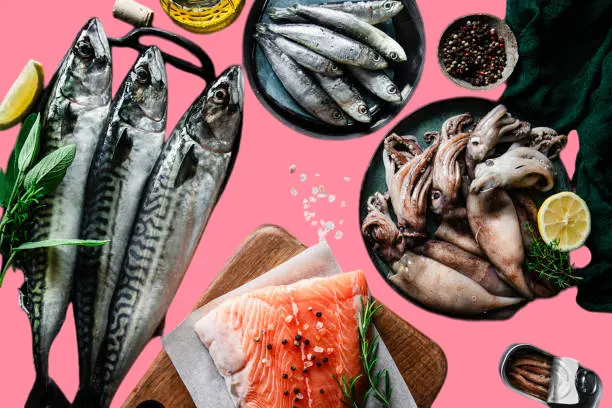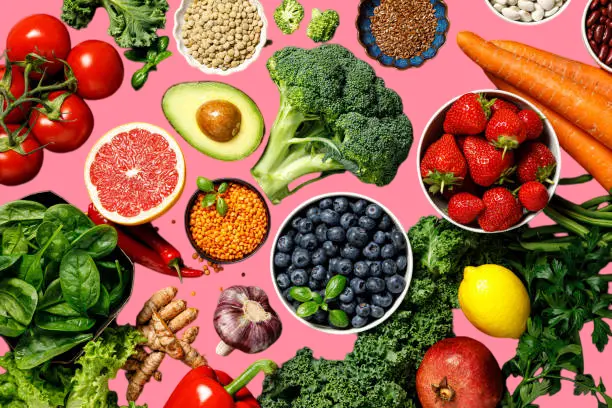The first months of pregnancy are a delicate and sensitive stage that requires special nutritional care to ensure the health of the mother and the safety of the fetus.
Food plays a pivotal role in supporting fetal growth and strengthening the mother's body, but there are some foods that are recommended to be avoided due to their potential risks.
First: Fish High in Mercury as a Toxic Element

Some types of fish, such as shark, kingfish, and mackerel, contain high levels of mercury, a toxic element that:
- Exposure to mercury can lead to birth defects or developmental delays.
- It is recommended to completely avoid these types of fish during the first months.
Second: Undercooked Meat and Infection
Eating raw or undercooked meat may carry the risk of infection with Toxoplasma gondii or Listeria. Therefore:
- It is best to ensure that meat is thoroughly cooked before eating.
- Avoid processed or cold meats.
Third: Unpasteurized Dairy Products and Bacteria
Unpasteurized dairy products may contain harmful bacteria such as Listeria:
- These products include some soft cheeses, such as blue cheese and soft white cheese.
- It is best to choose only pasteurized products to ensure safety.
Fourth: Raw or Undercooked Eggs and Poisoning
Raw eggs may carry the risk of food poisoning due to salmonella bacteria. Therefore:
- Ensure that eggs are thoroughly cooked before eating.
- Avoid foods containing raw eggs, such as some desserts or sauces.
Fifth: Canned Foods and the Effect of Preservatives
Some canned foods may contain Listeria bacteria or preservatives that may have negative effects. Therefore:
- It is recommended to cook canned foods before eating them.
- Check the expiration date and product quality.
Sixth: Excessive Caffeine and the Risk of Miscarriage
Excessive caffeine consumption may increase the risk of miscarriage or low birth weight. Therefore:
- It is recommended not to exceed 200 milligrams of caffeine per day.
- Caution should be exercised with various sources of caffeine, such as coffee, tea, and soft drinks.
Seventh: Salted and Roasted Nuts, Due to Their Sodium Content
Excessively salted or roasted nuts contain high levels of sodium and fat, which may cause fluid retention and high blood pressure. Therefore:
- It is preferable to eat raw or roasted nuts without salt in moderation.
- Avoid salted nuts, especially if you have health problems such as high blood pressure.
Eighth: Sugary Foods and Weight Gain
These foods may cause excessive weight gain and affect blood sugar balance. Therefore:
- Reduce your intake of sweets and fast food.
- Focus on a healthy, balanced diet.
Ninth: Unreliable Herbs and Natural Supplements and Uterine Contractions
Some herbs may affect pregnancy and cause premature contractions or complications. Therefore, you should:
- Consult your doctor before taking any supplements or herbs.
- Avoid products that do not have a medical approval.
Tenth: Unwashed Fruits and Vegetables and Bacteria

Eating fruits and vegetables that have not been washed properly may expose the pregnant woman to harmful bacteria and parasites, such as Toxoplasma gondii. Therefore, you should:
- Wash all fruits and vegetables thoroughly with water before eating them.
- It is preferable to peel some varieties that are difficult to clean.
Frequently Asked Questions About Foods Prohibited During the First Months of Pregnancy
Can I eat raw fish, such as sushi?
No, it is recommended to avoid raw fish during pregnancy due to the risk of infection and bacteria.
Is it safe to drink coffee in small amounts during pregnancy?
Yes, but caffeine intake should not exceed 200 mg per day to maintain a healthy pregnancy.
Is eating soft cheese always prohibited during pregnancy?
Unpasteurized soft cheese should be avoided, while pasteurized cheese is safe.
Can you eat processed meats such as salami?
It is recommended to avoid processed meats or eat them thoroughly cooked to reduce the risk of infection.
Article Summary
Paying attention to nutrition during the first months of pregnancy is essential to ensure the health of both mother and fetus.
Therefore, avoiding foods that may contain harmful bacteria or toxins helps reduce the risk. Moderating caffeine consumption and abstaining completely from alcohol also enhances the chances of a healthy and safe pregnancy. Consulting a doctor is always the most important step in determining an appropriate diet.